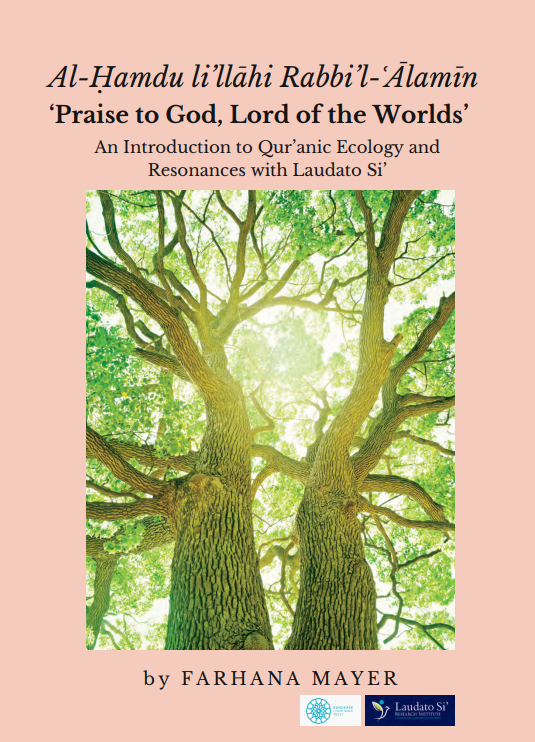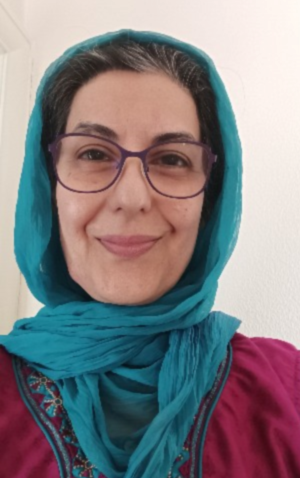An Introduction to Qur’anic Ecology and Resonances with Laudato Si’
Farhana Mayer
 The Laudato Si’ Research Institute is delighted to announce the online publication of the book, Al-Ḥamdu li’llāh Rabbi’l-ʿĀlamīn ‘Praise Be to God, Lord of the Worlds’: An Introduction to Qur’anic Ecology and Resonances with Laudato Si’.
The Laudato Si’ Research Institute is delighted to announce the online publication of the book, Al-Ḥamdu li’llāh Rabbi’l-ʿĀlamīn ‘Praise Be to God, Lord of the Worlds’: An Introduction to Qur’anic Ecology and Resonances with Laudato Si’.
What are the commonalities between the Qur’an and the papal encyclical Laudato Si’? Qur’anic hermeneutics scholar Farhana Mayer sets out to explore this question in a new publication that presents Qur’an-based theological and ethical principles that are applicable to integral ecology. Through a systematic, comparative study of the two texts, Mayer reveals that significant common ground exists between Qur’anic and encyclical perspectives, including perceptions of the natural world as a precious part of God’s creation, the interrelatedness of all creation, and the need for people to manifest ethical care towards other humans, all living creatures, and the earth itself. A unique feature of the study is the description of the most beautiful names of God as an overarching framework for human living and decision-making, Mayer links Laudato Si’s integral ecology paradigm to the Islamic concepts of divine unity (tawḥīd) and primordial nature (fiṭrah). Like Laudato Si’, the study seeks to go to the anthropological roots of our ecological crisis, and rediscover the rich treasure that religious traditions can offer, in this case the Qur’an, to remedy the damage we have done, for ‘there can be no renewal of our relationship with nature without a renewal of humanity itself. There can be no ecology without an adequate anthropology.’ (LS 118).
This book is the fruit of the Qur’anic Resonances of Laudato Si’ project, part of the Christian-Muslim Dialogue on Integral Ecology research cluster at the LSRI that aims to explore the comparative perspective between Christian and Muslim traditions.
The book can be accessed for free here.
Original article: https://lsri.campion.ox.ac.uk/news/new-lsri-book-explores-commonalities-between-quran-and-laudato-si
___________
An Introduction to Qur’anic Ecology and Resonances with Laudato Si’
About this Book:
An Introduction to Qur’anic Ecology and Resonances with Laudato Si’ presents Qur’an-based theological and ethical principles that are applicable to integral ecology. This study presents clear and strong Qur’anic guidelines that can be referred to by Muslims in addressing the ethical, ecological and environmental issues faced today. The study relates the central encyclical idea of integral ecology to several Islamic concepts, particularly the interconnected unity of all creation, the innate nature of God and humankind, and the Qur’anic principles of mercy, balance, justice, and moderation. Key Muslim faith-based critiques of the human actions that have led to the current global predicament are also discussed. These critiques accord with aspects of Catholic social teaching.
This study unpacks the Qur’anic resonances with the foundational themes presented in the preliminary section of Pope Francis’ encyclical, Laudato Si’: On Care for our Common Home published in 2015. It demonstrates that significant common ground exists between Qur’anic and encyclical perspectives with regard to these themes, including perceptions of the natural world as a precious part of God’s creation; the interrelatedness of all creation; the understanding of humankind as the being in whom earth and spirit are conjoined; the need for divine guidance; and the need for people to manifest ethical care towards other humans, all living creatures and the earth itself. Conceptual overlaps such as these provide a strong foundation for Catholic-Muslim interfaith partnerships, as we seek to care for our common home.
About the Author:
 Farhana Mayer has had a long-standing involvement in interfaith dialogue, and in promoting understanding within and among different faiths. She was formerly a lecturer in Sufism at the School of Oriental and African Studies (2010–2012) and at the Institute of Ismaili Studies, where she also lectured in Qur’anic Exegesis and headed the Graduate Programme in Islamic Studies and Humanities (2012–2015). Farhana is a published author in her field of Qur’anic Hermeneutics. Her publications include: Spiritual Gems: The Mystical Qur’an Commentary Ascribed to Ja`far al-Sadiq (Louisville: Fons Vitae, 2011); Anthology of Qur’anic Commentaries: On the Nature of the Divine with F. Hamza and S. Rizvi (Oxford: Oxford University Press/Institute of Ismaili Studies, 2008). Her recent research at Oxford University explores the qualitative and ontological relationship between God and humankind from a Qur’anic perspective.
Farhana Mayer has had a long-standing involvement in interfaith dialogue, and in promoting understanding within and among different faiths. She was formerly a lecturer in Sufism at the School of Oriental and African Studies (2010–2012) and at the Institute of Ismaili Studies, where she also lectured in Qur’anic Exegesis and headed the Graduate Programme in Islamic Studies and Humanities (2012–2015). Farhana is a published author in her field of Qur’anic Hermeneutics. Her publications include: Spiritual Gems: The Mystical Qur’an Commentary Ascribed to Ja`far al-Sadiq (Louisville: Fons Vitae, 2011); Anthology of Qur’anic Commentaries: On the Nature of the Divine with F. Hamza and S. Rizvi (Oxford: Oxford University Press/Institute of Ismaili Studies, 2008). Her recent research at Oxford University explores the qualitative and ontological relationship between God and humankind from a Qur’anic perspective.
Reviews:
“This work is a refreshing study of Islamic ecology through a forensic analysis of the key concepts of divine unity and disposition. Not only is it unique in forging a connection between these seemingly disparate ideas, it also draws on ‘the most beautiful Names of God’, mentioned in the Qur’an, as a source of ecological inquiry. Further, it reveals strong resonances between ecology expressed in the Qur’an and the encyclical themes of the Laudato Si’. Mayer’s lucid style makes easy reading of what are often recondite concepts and ideas. This study thus enjoys the dual distinction of being a call to action for ecological preservation as a manifestation of faith, and a highly useful comparative scrutiny of Islamic and Catholic ecology, specifically, and sacred literature, more generally.”
Dr Ismail Lala (Assistant Professor of Philosophy, Department of Humanities and Social Sciences, Gulf University for Science and Technology).
“Farhana has dug deep into both the Qur’anic and Biblical traditions to rediscover profound commonalities between what we in Islam describe as ‘the People of the Book’. The timing couldn’t be more apt as we are now experiencing the collapse of eco-systems caused by our own hands. We have much to do to regain a semblance of balance in the natural world and my prayer is that working together we will preserve something of the beauty and generosity of creation for future generations.”
Fazlun Khalid (Founder, Islamic Foundation for Ecology and Environmental Sciences; Author of ‘Signs on the Earth, Islam, Modernity and the Climate Crisis’).
“An inspiring study of the resonances between the Qur’an and the Laudato Si’, grounding ecology in the Qur’anic Divine Names and Signs. This is a superb source and reference work for interfaith Muslim-Christian dialogue and joint action on environmental challenges to humanity, made in the image of God.”
Shaykh Dr Usama Hasan (PhD, Former Planetarium Lecturer at the Royal Observatory Greenwich).
“An Introduction to Qur’anic Ecology and Resonances with Laudato Si’ is indeed a very important publication in bringing together the understanding of different religions on the environment to appreciate that we have much in common.”
Dr Iyad Abumoghli (Founder and Director, United Nations Environment Programme Faith for Earth Coalition).
“Laudato Si’, Pope Francis’ landmark encyclical letter on Care for Our Common Home, was an invitation to “a new dialogue about how we are shaping the future of our planet,” and augured “a conversation which includes everyone” (LS, 14). It is wonderful to see that this conversation is indeed happening, with a remarkable contribution from faith communities around the world. I congratulate Farhana Mayer for sharing with us this exquisite mosaic of resonances of Laudato Si’ within the rich Islamic theological and ecological tradition. Seven resonant chords struck within me while reading her beautiful work: the emphasis on praise (hamd) to the Creator, the symbolic view of creation as living signs (āyāt) of God, the centrality of mercy (raḥīm), the recovery of our responsibility as guardians (khalīfah) of creation, the importance of balance, the attention to eco-justice, and climate justice, in particular, and last but not the least, the insistence on moderation.”
Fr Joshtrom Isaac Kureethadam (Vatican Dicastery for Promoting Integral Human Development).
“Mayer identifies and sets out lucidly the relevant ‘theological and ethical principles’ derived from the Qur’an as the authoritative word of God, discussing the verses in question, and their resonances with the ideas or ‘themes’ advanced by Pope Francis in the first part of his 2015 encyclical Laudato Si’. The study is highly accessible to readers of different theological and cultural backgrounds. This is a beautifully produced book which offers a theologically rich account of a vital topic of today’s world. I warmly recommend it.”
Richard Finn O.P. (Blackfriars Hall, Oxford)
Original article: https://lsri.campion.ox.ac.uk/node/1697
